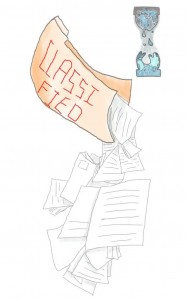WikiLeaks benefits the average citizen
 The Bill Condon-directed film, “The Fifth Estate,” about Australian WikiLeaks founder Julian Assange came out Oct. 18th. It has generated great controversy with the real life subject of the film, Assange, protesting its release. Assange wrote in a letter to Benedict Cumberbatch, the English actor who plays Assange in the movie, that the film “seeks…to cut out principle with hypocrisy… to cut the truth with lies… to create a work, not of fiction, but of debased truth.”
The Bill Condon-directed film, “The Fifth Estate,” about Australian WikiLeaks founder Julian Assange came out Oct. 18th. It has generated great controversy with the real life subject of the film, Assange, protesting its release. Assange wrote in a letter to Benedict Cumberbatch, the English actor who plays Assange in the movie, that the film “seeks…to cut out principle with hypocrisy… to cut the truth with lies… to create a work, not of fiction, but of debased truth.”
While the film generates varied responses, one cannot deny that Assange’s WikiLeaks has changed social media and the means by which people gain information. It can also be argued that, for the common citizen, WikiLeaks proves to be a valuable tool in ensuring government transparency and providing citizens with classified government information, thereby allowing each citizen to analyze the long-held secrets of his or her government.
“The benefits WikiLeaks reaps for the common citizen of the first world isn’t immediate or direct but rather [WikiLeaks] is impactful because it publishes uncensored documents which allow the average person to gain access to a greater truth,” junior Noha Ayoub said after watching “The Fifth Estate.” “This allows [people] to make more educated decisions if they vote in the future.”
Governments classify information they deem “sensitive.” Information is deemed sensitive if the release of said information would cause significant damage to national security. Assange initially published classified information because he believed that governments were wrongly increasing the number of classified documents, thereby keeping information from the public.
WikiLeaks exposed a major U.S. government operation, Obama’s dilemma over the handling of Guantanamo detainees. Since his campaign for the presidency, Obama has promised the closure of the Guantanamo Bay detention camp; however, the controversial camp remains open to this day. According to an article by The New York Times, “Cables depict U.S. haggling to clear Guantanamo,” the classified information released by WikiLeaks revealed that U.S. diplomats have been searching for and bargaining with other countries that might allow released detainees to settle in said countries.
The leaked information also revealed that President Obama might financially assist and meet with the leaders of countries that promise to allow detainees to settle there.
This case makes lucid WikiLeaks’ ability to illuminate government operations that impact the lives of people across the globe. By informing the common man on the actions of his leader and government, WikiLeaks performs an important task since the public must be aware of how its elected rulers manage political affairs. Therefore, WikiLeaks serves to promote the idea of an educated public.
“After watching the movie, I feel that WikiLeaks is beneficial for the average citizen,” junior Olivia Serritella said. “[WikiLeaks] doesn’t give people the censored version of events that the government tries to sell people on; it exposes corruption and actually brings justice to a lot of people. Even though the way Assange gets his information isn’t smiled upon, he is still seen as a hero by many people fighting for government transparency.”
WikiLeaks empowers the average citizen by exposing the actions of his leaders and making accessible classified reports. This compels citizens to think before they lend their support to any particular political leader or institution. As a consequence of WikiLeaks, unprecedented limitations have been imposed on governments as privacy is becoming obsolete.
WikiLeaks furthers founding father James Madison’s idea, which stresses the education of the public in political affairs, that “a popular government without popular information or the means of acquiring it is but a prologue to a farce or tragedy or perhaps both.”
Essentially, WikiLeaks promotes the educating the public and getting people involved in government matters; after all, a country is comprised of its citizens, most of them average people who deserve to be informed on matters that affect both their country and the international community.

